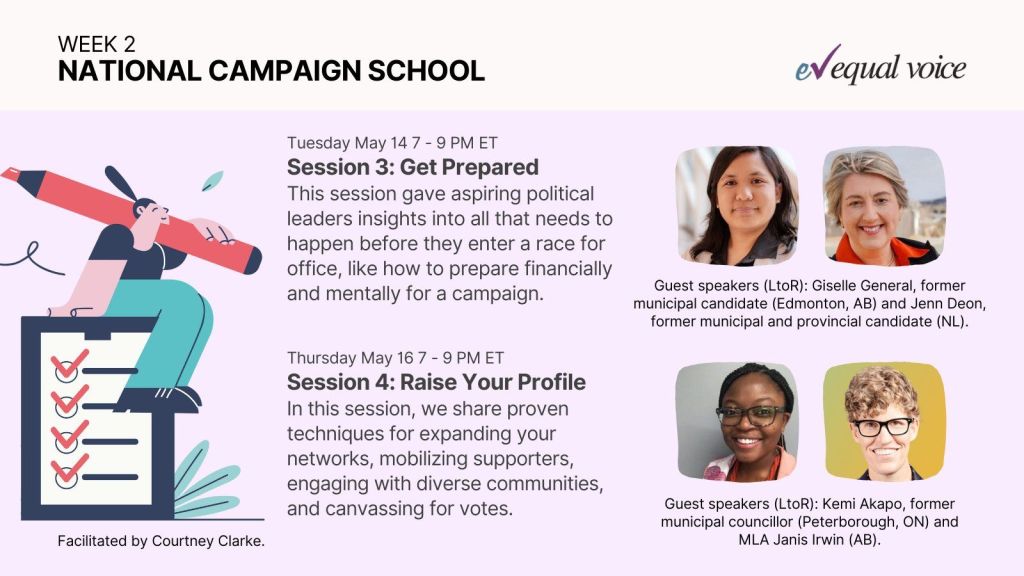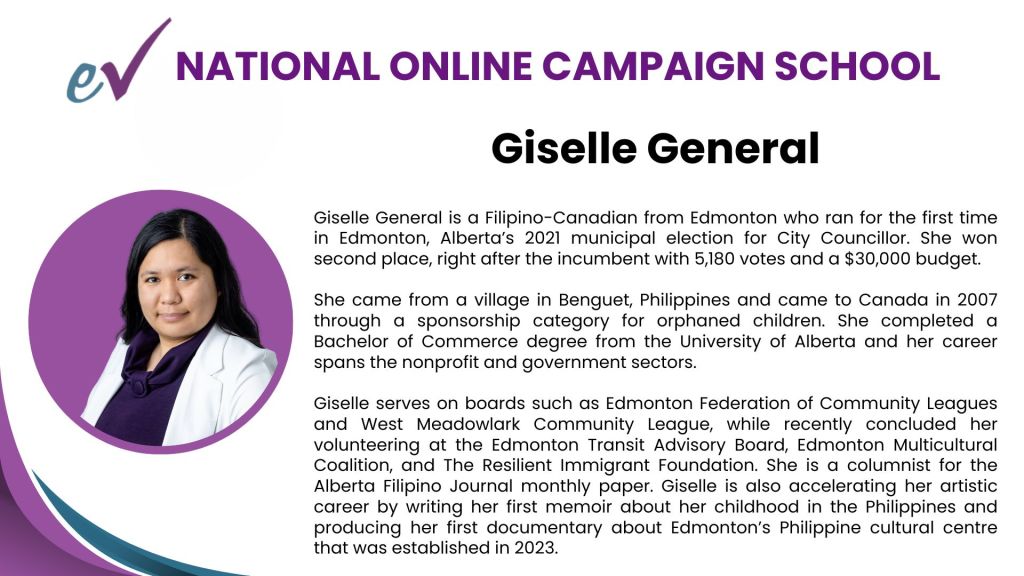By: Giselle General
I thought that being an election campaign failure – as in not winning the seat I was running for – would render my efforts meaningless. So it is to my surprise that I have been requested to speak to my experiences as an election candidate. I suppose there is truth to the saying that it is through mistakes and failures that people can gain the most growth.
I personally had benefitted from election campaign schools in the past, the first being the eight-month long program by the City of Edmonton back in 2017. The very local context of that program was really helpful for me as someone who was just somehow considering the idea of bring politically active at a candidate level. The experiences shared by the guest speakers then, many of which actually won, made the experience real and human.
Equal Voice is a Canada-wide organization helping women who want to run for politics or support those who wanted to do so. The first workshop I attended was hosted by the Alberta chapter of the organization. If I recall correctly, the Alberta chapter is no longer functioning, but the national organization continues to be active.
It looked like the other provincial chapters were super active as well. It was why I was so surprised when an organizer from the Newfoundland and Labrador chapter contacted me in October to speak to my experiences for their online election campaign school events. I was more than happy to share (maybe vent a little bit, haha) about what I did from 2018- 2021 to prepare for full-on election campaign mode leading to October 18, 2021.
Then in early April I heard from them again to speak on the same topic for their current campaign school. I guess I shared a few useful things last time, because the instructions I got were “just do the same things as last fall as you did great.” I’m really thrilled about the new options available now that online events are more frequent.

For those interested, here are my speaking notes, the longer version of what I shared .
- INTRO: Even if you forget specific details, the main takeaways I’d like to share are:
- Self awareness and using your strengths and skills as a foundation is very important.
- Remembering there’s life after the election so consider your decisions accordingly.
- All the things you do and life/ professional skills you have are all useful for the campaign.
- Take inventory of your privileges and points of marginalization, being aware helps with planning and being compassionate to yourself.
- Conversations you had with your loved ones, your employer
- Husband – Clearly defined role of my family members. For me, the campaign is NOT a family affair. There were some tradeoffs, but separating my campaign and family life from the get go was worth it for me. “I want to continue to be married after the election.”
- Brother: I reassured my brother that it’s not as violent as the Philippines and (maybe) I won’t get murdered here. But if I do, my will, and life insurance, and organ donor card is up to date and they know what to do.
- Employer (Nonprofit Org): They knew I do a lot of community service and when I went to an election campaign school and all of my city volunteering, it’s just a matter of time. We discussed things such as what type of leave (banked vacation + some unpaid time off), how much (or little) should I publicize my employers name to protect their privacy (I didn’t use their name), and duration of time off (2 months until end of the election month – I returned November 1).
- What kinds of things were you doing to prepare for your campaign, in advance?
- 2021 was my first time running so it wasn’t like I had a strict guideline or a playbook. Also, COVID-related restrictions truly influenced my decisions. I wanted to behave as compassionately and ethically as I could, so I likely wasn’t going out in public right away compared to many people.
- Personally, with the things I did, I never had a political objective in mind. I never thought of “oh I will do this so that when I run they will think of me at the election” because frankly even now it feels sleazy to me. My focus at the time was to continue the things I already do that has some kind of public component and sharing about what I do and what I believe in regularly on social media. On social media I did the 70 – 30 rule. 70% re-posting and amplifying content I resonate and believe in, 30% posts about what I’m interested in or doing that aligns with my values. If there’s an overlap with municipal politics, that’s a bonus.
- I also found community service that had the overlap of 1 – things I like, 2- things I am good at 3 – some level of public profile and 4 – some connection to the city or municipal matters. Transit board, neighbourhood board, multicultural journalism, city-focused nonprofit boards.
- The rest are tasks that helped me in my personal life that have a positive spill-over effect for running for office (as outlined below).
- How did you save money and for how long?
- Saved money for 3 years (up to $17,000) so I have savings to pay the full amount candidates can pitch for the campaign, and cover my entire salary when I’m was away for 2 months. I did this from 2019 – 2021, $500/ month and the pandemic also helped cut my expenses. I’m doing this again. I’m a DINK household who is NOT passionate about travel.
- How did you grow your network in advance of putting your name on the ballot, and prepare your network for this political journey you were taking?
- For me, given I’m an introvert, yes social media helped a lot. I know many candidates are community leaders that seem to be in every community fundraiser, picnic, gala and public event. And that likely increased their visibility. But that’s not who I am. Also in 2020, opportunities are more limited and I wanted to be – and still am – COVID-cautious.
- I learn about people who have different beliefs by curating my social media feed (particularly Twitter and LinkedIn) strategically. I don’t argue or shame them, but I **do** read the hot takes and the comments.
- Also, through paying attention to the local media here, including actually paying subscription fees for a local media startup, I have deeper understanding and awareness of local political issues.
- Any appointments to be made, or tips for endurance, mental health, physical health on the campaign trail?
- I went to therapy (to address personal issues which in my case is sexual abuse trauma) and had therapy on an ongoing basis throughout the campaign. Fortunate enough to find free ongoing mental health resources. Need to search and apply and wait.
- Not commit to any political parties at a federal or provincial level.
- Not be ashamed of my lone wolf/ introvert tendencies. I worked with it, not against it. It saved me stress and angst.
- Share personal observations on the campaign trail – I talked about human but mundane things such as safety, bathroom access, accessibility in apartments, (lack of) wheelchair ramps on most houses, taking the bus to carry campaign supplies around, etc.
- While it sounded like an exaggeration, I made a “extreme worst case scenario” list of what will make me cancel the campaign or prevent me from running (ex. me dying. my husband dying, our house going on fire and losing our home. either of us becoming bankrupt, amputated, drastically disabled, etc.)
- I also made a list of my campaign goals, with a realistic and dark side because of my reality as woman who is an immigrant, who looks Asian/ Indigenous, who is COVID-cautious, who cannot drive and has bladder and mobility issues. 1 – not die, 2 – not be in financial ruin, 3 – run a campaign based on my principles, with a combination of inspiring and education, 4 – win.
- Highlights, lessons learned on the campaign trail? Things you’d do differently the second time you run?
- If I run again, I will do many of the prep I did from home and personally that helped me in 2021. I had very clear expectations and boundaries with my husband and with myself. (See tips above).
- But I will be more careful of what I say on social media 2 years before the campaign period. I made a social media post about running for election and as a consequence, one of the boards where I volunteer asked me to step down from an executive (Vice President) position from that board. While I wasn’t actively campaigning yet, the risk of conflict of interest, real and perceived, is too risky for them. I was actually afraid I’ll be asked to step down, and that would have been bad for me as I’m the only Filipino member of the board and I want to stay and make an impact there. I continued to be a ‘regular’ board member and became an executive again after the election. But the timing of when you official share your interest in running, even if you are not officially on campaign mode yet, can impact your current community involvement.
- Employer conversations will be different this time around as I am a public servant now (work for provincial government). I’ll need to be a lot more quiet about it and know my work benefits and rights early next year.
- Maybe, using a language, timing and setting that resonates with my values of a “non politically smarmy politician”, perhaps I will share in in-person conversations more often that I will be running. It looks like there were some awareness gained in 2021 and there were offers for people to support more directly in the future.
- I will continue to have strict accessibility standards. So many people are still so ableist and don’t know how to produce accessible digital communication. I did it all and I’m proud of it. I’ll do it the same way again and not compromise on this.
- Remind myself again that THERE IS LIFE AFTER THE ELECTION, if I win, then that begins my journey as an elected official. if I lose, I gotta do the clean up, reporting and back to my former job and family routine at some point. Have a long term view of decisions you make.

It seemed like the perspectives I shared were well-received based on the reactions in the smaller discussions and the follow-up email from the organizer. It was a great experience, especially for doing it the second time around, and if they invite me for a future talk or panel I certainly will do it again.
For those who wanted to run, it is a lot of work, and some of the things I did contradicted the other panelist’s experience. So take what works and make it your own.
